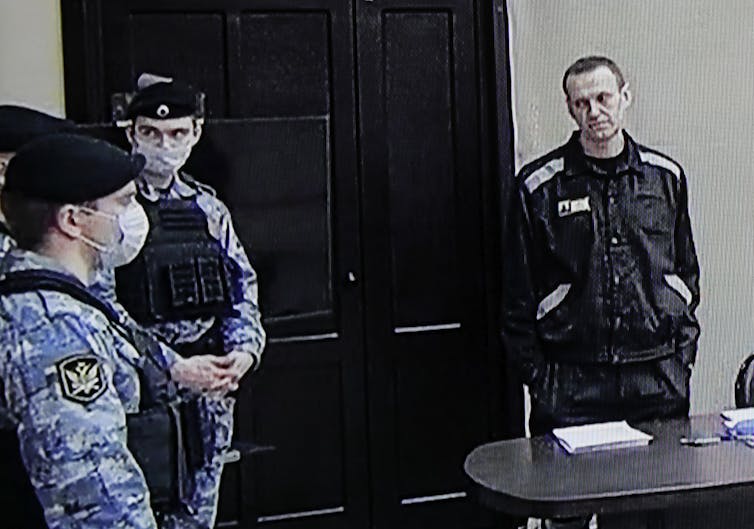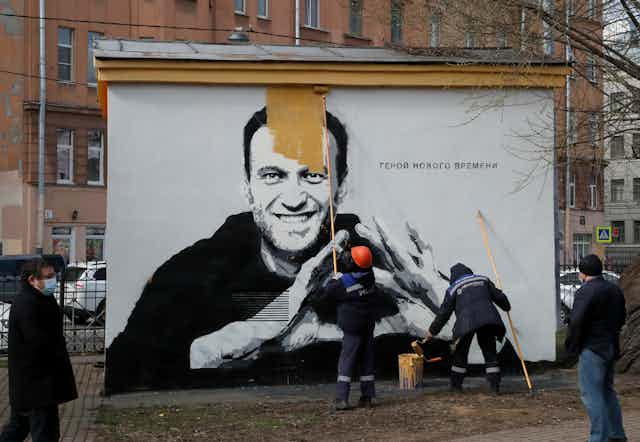One of the last lines jailed Russian opposition leader Aleksei Navalny speaks in the eponymous new CNN documentary is a quote usually attributed to the 18th-century philosopher Edmund Burke: “The triumph of evil is for good people to do nothing.” It is unclear whether Navalny sees Russian politics as a black-and-white, good-versus-evil scenario or is playing to the film’s primarily US audience.
I urge everyone to see the film, Navalny. It is a fascinating depiction of Russian opposition to the country’s increasingly autocratic leader and shows the lengths to which the Kremlin will go to stop it.
I do have criticisms. It is unclear on the access the director and film crew had to Navalny. They seem close to him during the time he spent in Germany, recuperating from being poisoned with the Novichok nerve agent in 2020, but their contact appears highly managed.
There are moments of even-handedness, including a visibly uncomfortable Navalny explaining away his previous ultra nationalism and speeches at the 2009 Russian March. The Russian March is an annual nationalist demonstration – and is attended by many people with neo-Nazi links. It is good to see that the film’s director, Daniel Rohr, address this. Yet, when it comes to Navalny and the western media more generally, there is an air that because Navalny is against Vladimir Putin, he is somehow pro-western. This sense of “good” (Navalny) versus “evil” (Putin) pervades the documentary.
Legal issues
Certainly, Navalny faces some significant hurdles. Two court cases, in 2012 (involving the theft of timber) and in 2014 (for defrauding the Russian subsidiary of Yves Rocher) hang over Navalny like the Sword of Damocles. These cases, which initially resulted in suspended sentences, have been conveniently closed and reopened depending on whether the Putin regime has needed to restrict Navalny’s movements. Most recently, in 2021, the suspended sentence in the Rocher case was replaced with a real three-and-a-half year sentence.

There’s no question Navalny has faced intense pressure, as expected of any opposition politician working in an autocracy. But there remain questions about his past. In 2007, Navalny allegedly shot a man in a brawl with an air pistol. In the intervening years, Navalny has made himself presentable and become more of a western-style politician.
This is the image that the film tries to portray. Navalny comes across as likeable – but there remains the feeling that, behind this facade, is someone who isn’t quite the progressive hero he is represented as. His comments about Crimea being Russian and previous nationalist rhetoric against Central Asian and Caucasian migrants point to this. Having spoken with some in the Russian opposition, I felt that some think that if Navalny was president, Russia would merely swap dictators.
Divided opposition
This raises a further point not addressed in the film. The Russian opposition is divided. For years, it has been hobbled by in-fighting. Rather than unite against a common enemy, opposition figures have often been riven by which strategy to use. Some opposition parties, such as A Just Russia (Spravedlivaia Rossiia) are licensed by the Kremlin and largely support Putin. Others, including the People’s Freedom Party (RPR-Parnas) – the party of Boris Nemtsov before he was assassinated in Moscow in 2015 – are bitterly opposed, and this continues to muddy the waters.
The film does not address these divides which – perhaps inadvertently – results in the perception that Navalny is the only opposition leader. There is no denying that Navalny’s anti-corruption campaigns have resonated across Russia and overseas. Navalny’s expose of Dmitry Medvedev’s wealth directly contributed to 45% of Russians saying Medvedev should resign as prime minister in a poll taken in March 2017. Another video, Putin’s Palace: History of World’s Largest Bribe, which was written and narrated by Navalny and launched online in February 2021 was watched by at least 26% of Russian adults.
And here’s the problem. In an autocracy, people are unwilling to protest. Watching a video does not necessarily mean supporting the cause. A Levada Centre survey, which asked if respondents had watched the Putin’s Palace video, found that of the 26% who had, 77% felt their view of Putin was unchanged. It remains difficult to get people out of their comfort zone.
The 2021 anti-corruption protests were the first countrywide demonstrations. Navalny showed that he and his team could organise protest, with offices across Russia. But there were only 10,000 demonstrators in Moscow, a nominally liberal city of nearly 12 million people.
Of course, organising protests in an autocracy is nearly impossible and Navalny is fighting the odds. But there is a cognitive dissonance in the west that he is the answer and the Kremlin fears him. If Putin remains in power, there will not be free elections – so it is conjecture whether Navalny would win. A free(ish) election in Moscow in 2013 saw Navalny get 27% of the vote. This is not a bad result, but highlights that the opposition is not well supported, even in the capital.
Navalny is not the only opposition figure of consequence. But Leonid Volkov, Mariya Pevchikh and Lyubov Sobol are now all abroad and the opposition remains divided. Having become the figurehead of disparate groups, Navalny gets the most attention – but he is more of an enigma then the film shows.
Navalny’s “good men” quote leaves you thinking he is the “good man” who is at least trying to do something. But here’s a flaw in an otherwise excellent film – it portrays Navalny as the only Putin alternative and reduces his chequered history to insignificance.

